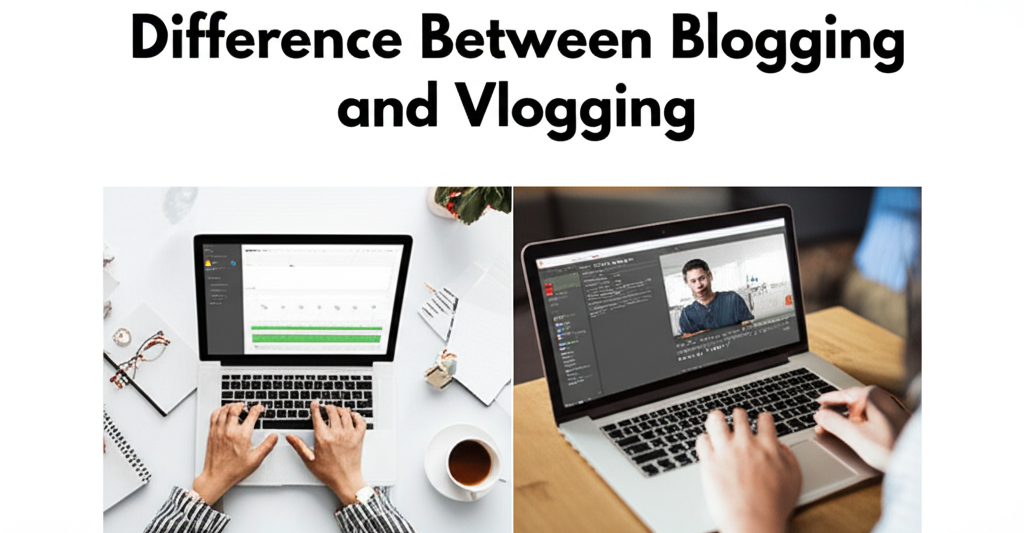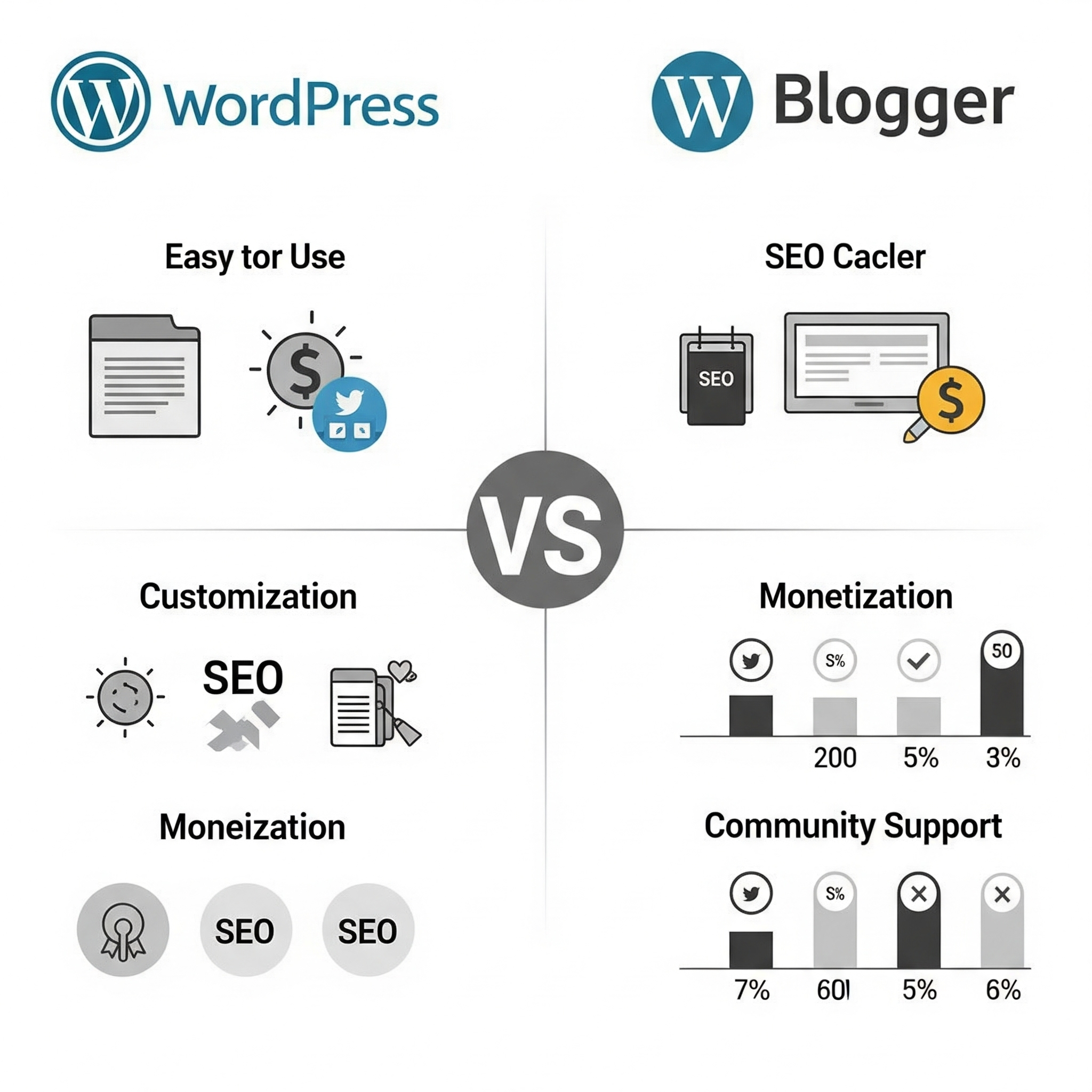The Difference Between Blogging and Vlogging: A Detailed Comparison In the digital era we live in, everything revolves around creating content. There are thousands of people and businesses who are starting blogs and vlogs to create brand, to educate, and to make money; and why not? But it’s important to know the difference between blogging and vlogging a detailed comparison
Each of them have their advantages and disadvantages. This extensive guide will help you understand the nuanced contrast between blogging and vlogging including content formats, audience interaction, and income opportunities
What is Blogging?
Blogging refers to the practice of posting written content on the internet. A blog is simply a website or a section of a website that is periodically updated with short essays, brief tutorials, product reviews and narratives.Difference Between Blogging and Vlogging: A Detailed Comparison
Common Types of Blog Content:
- How-to articles
- Personal stories
- Product reviews
- Listicles (e.g., “The 10 powerful tools for digital marketers”)
- Informational guides
Blogs are mostly hosted on sites such as WordPress, Blogger, Wix and Medium. Bloggers talk through the form of writing, photos, and occasionally infographics.
What is Vlogging?
Vlogging is a short term for video blogging, or video content creation. Vloggers film, edit, and post typically upload videos to such platforms as YouTube, Instagram Reels, TikTok, or Facebook.
Common Vlog Content:
- Daily life videos
- Travel diaries
- Tutorial videos
- Product demonstrations
- Behind-the-scenes videos
It takes a camera and video editing tools, as well and a personality that people can connect with through a camera
Difference Between Blogging and Vlogging: A Detailed Comparison
The biggest difference between blogging and vlogging is their content format. Blogs are based on text but vlogging is all about video.
This further breaks down into the important aspects of certain aspects
1. Content Format
Blogging: Relying mainly on the written word for its material, spliced with photographs, occasionally movies.
Vlogging: Entirely video storytelling, 100 percent visual
The difference between blogging and vlogging in format-That is what defines their respective workflows and audience preferences
2. Tools and Equipment
Blogging Tools:
- Laptop or desktop
- Blogging platform (WordPress, Blogger)
- SEO tools (Yoast, RankMath)
- Word processing software (Google Docs, MS Word
Vlogging Equipment:
- Camera or smartphone with a good camera
- Microphone
- Tripod or stabilizer
- Video editing software (AdobePremierePro, Final Cut Pro)
The equipment levels required to do a blog or vlog are different, as shown by the dumb plot.Vlogging usually needs more professional equipments
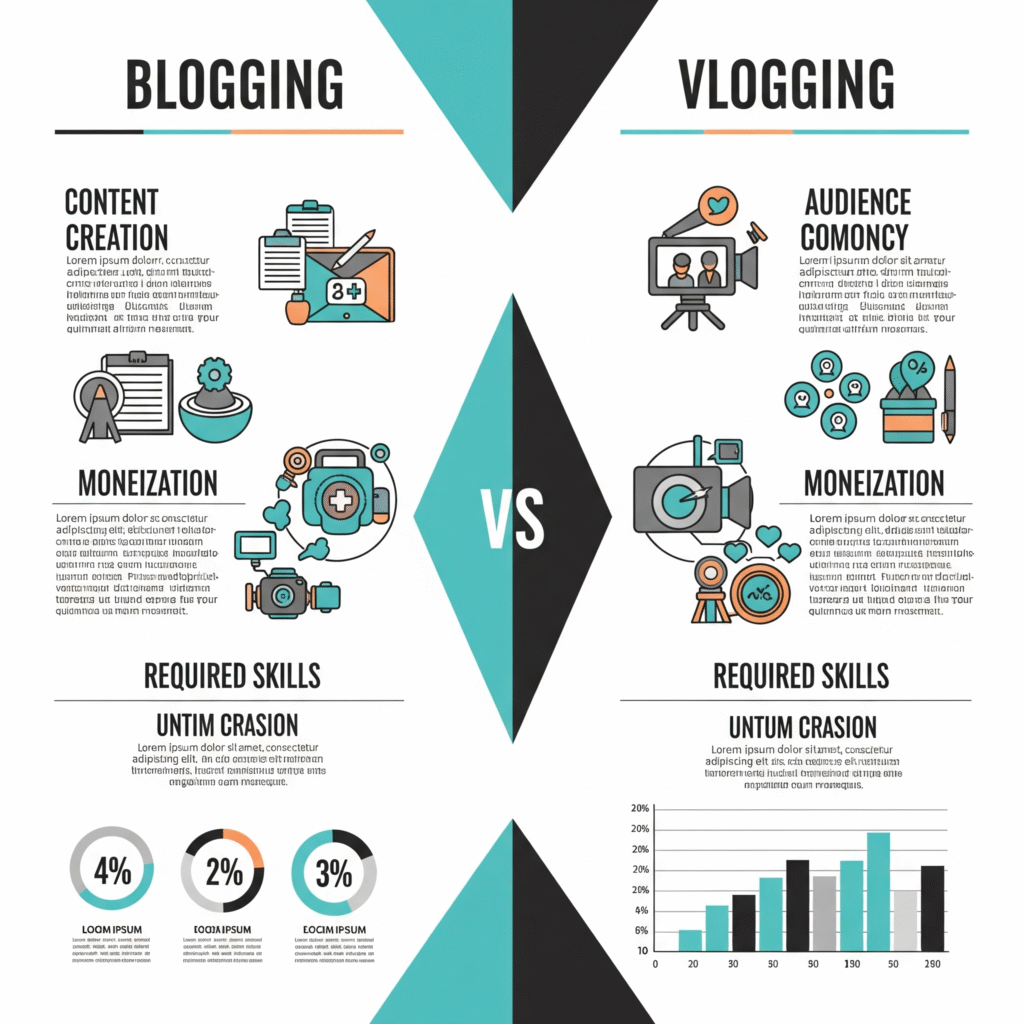
3. Time Investment
Blogging: Writing and perfecting a blog post can consume 2 to 6 hours of your day
Vlogging: It will take you 6 to 10+ hrs to record, edit, and publish a video depending on the length and quality of your video.
The difference between blogging and vlogging comes in the production of a single content. Vlogging tends to be more time-consuming
4. Monetization Methods
Blogging and Vlogging both are the ways of earning money only thing differ is the process.
Blogging Monetization:
- Google AdSense
- Affiliate marketing
- Sponsored posts
- Monetizing digital products or courses
- Email marketing funnels
Vlogging Monetization
- YouTube AdSense
- Brand sponsorships
- (affiliate links in video descriptions)
- Crowdfunding (Patreon)
- Live streaming gifts/tips
So the difference between vlogging and blogging lies with the medium/audio-visual content and the kind of content monetization strategies
5. Audience Engagement
Blogging: Interaction between audience is largely in the form of comments or emails
Vlogging: Engagement is best with likes, shares, video comments, and subscribes
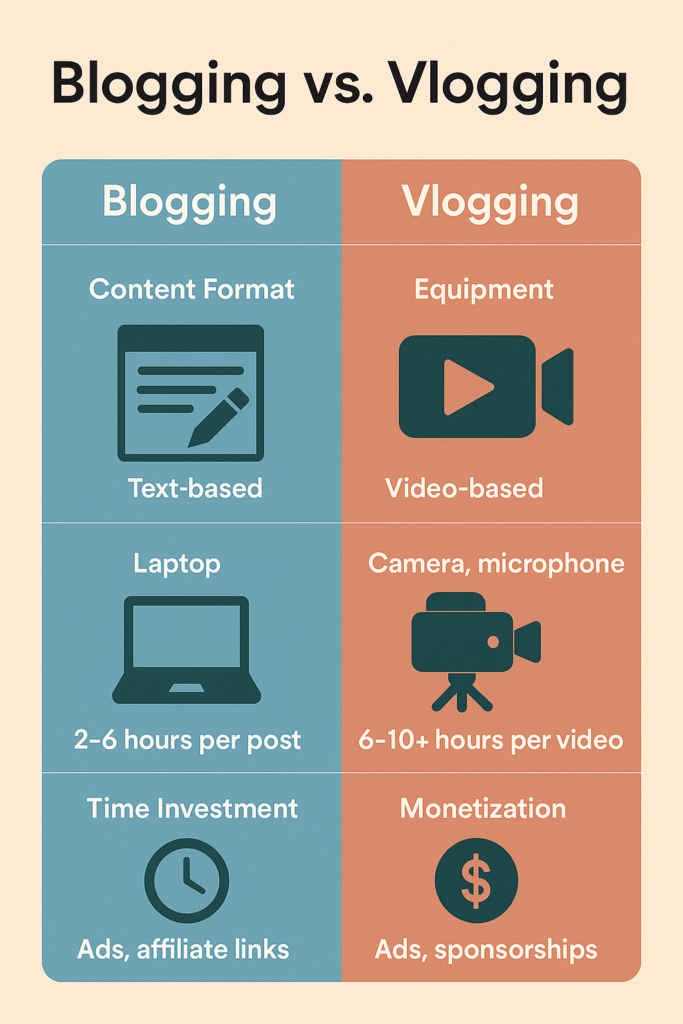
6. SEO and Discoverability
Blogging 💻
- It does require some basic keyword research.
- On-page SEO best practices (meta description, heading structure, internal linking)
- Building links
Vlogging:
- Takes advantage of video SEO (title, tags, description, thumbnails)
- Engagement metrics are having an impact on rankings
YouTube’s algorithm, which plays a huge role in what kids—and everyone else—watch, has been largely blamed
The biggest difference SEO-wise between blogging and vlogging is where you’re targeting — search engines themselves and how best to optimize content for them. Where bloggers have to optimize for Google SEO, vloggers have to optimize to rank on YouTube
7. Learning Curve
Blogging: Easier for beginners who are comfortable writing.
Vlogging: Aside from the upfront technology barrier of needing to learn video editing and camera setup, vlogging is all about the delivery
In terms of the difference between blogging and vlogging, that just kind of depends on what you’re good at. Writers will take to blogging, extroverts or visual storytellers will gravitate toward vlogging
8. Cost Involved
Blogging Costs:
- Domain and hosting
- Premium themes or plugins
- SEO tools (optional
Vlogging Costs
- Camera and mic
- Editing software
- Lighting, tripod, and accessories
Clearly, the difference between blogging and vlogging includes the initial and ongoing cost to get started.
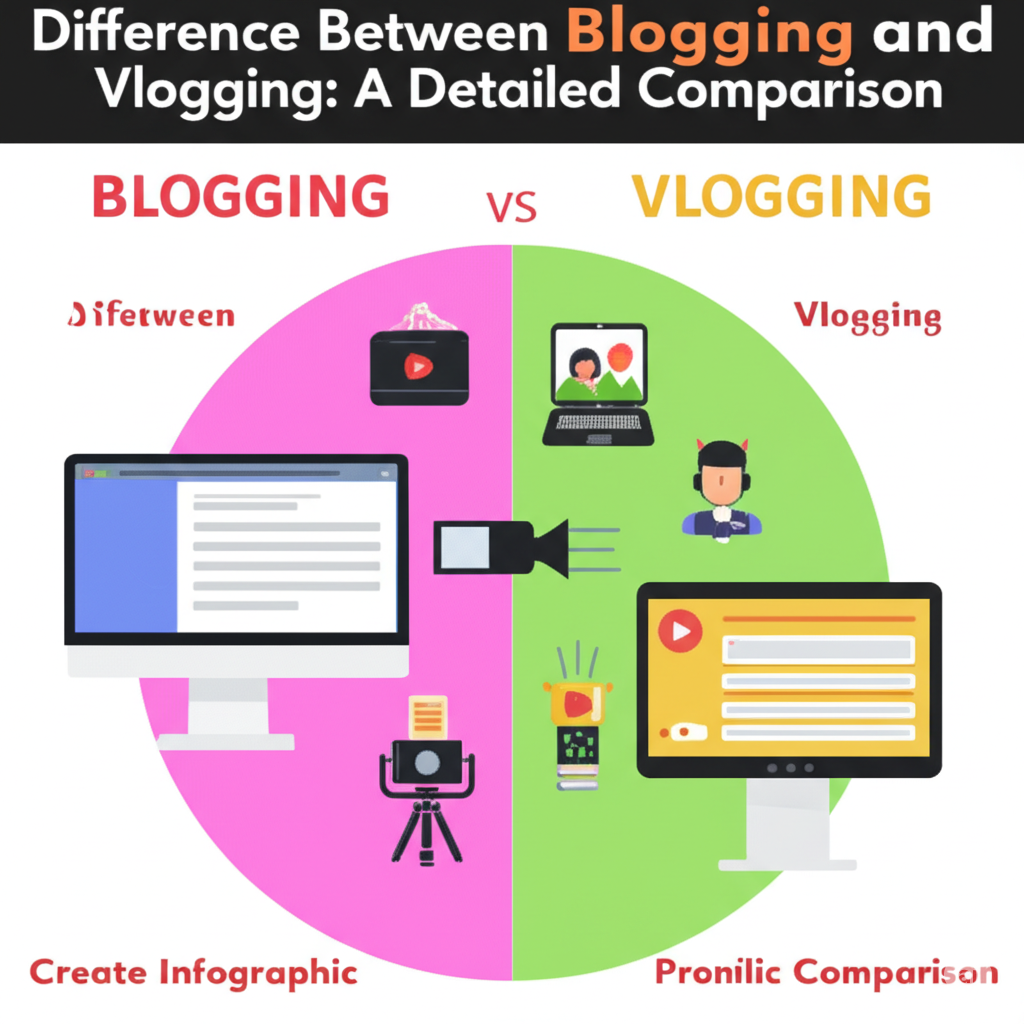
9. Traffic Sources
Blogging:
- Organic traffic from search engines
- Social media shares
- Email newsletters
Vlogging:
- YouTube recommendation YouTube algorithm Youtube algorithm
- Social media metrics
- Collaborations with other content creators
True, SEO and social sharing affect both blogging and vlogging—but that’s one of the Blogging vs. Vlogging SEO differences. It’s not about how appealing your content is or even how compelling your story is — it’s the algorithms that bring audiences to your work that make all the difference.
Which One Should You Choose?
Your choice between blogging and vlogging depends on your:
- Comfort with writing or speaking
- Budget for equipment and tools
- Goals (personal branding, income, audience engagement)
- Time availability
If you’re not comfortable in front of the camera but feel a passion to write, blogging might be a better outlet for you. If you’re lively in front of the camera and like to create short, engaging, visual narratives, vlogging is for you.
The blogging vs vlogging decision is really about what you’re best at
Can You Combine Blogging and Vlogging?
So a huge yes to that! This is just the reality of most creators, no matter which way you cut it, even if method #2 becomes the primary or only way to go. You can produce video blogs by embedding your video blog content in your blog articles or using video to repackage your blog content. Using this multi-channel combination strategy means you have a better chance of being seen and heard across all channels so that you can get the greatest exposure on each platform.
Combining the two together offers a huge SEO benefit. If you were to add an embedded video to a blog post, you’d likely increase average dwell time on that page increasing the chances of it earning a higher position.
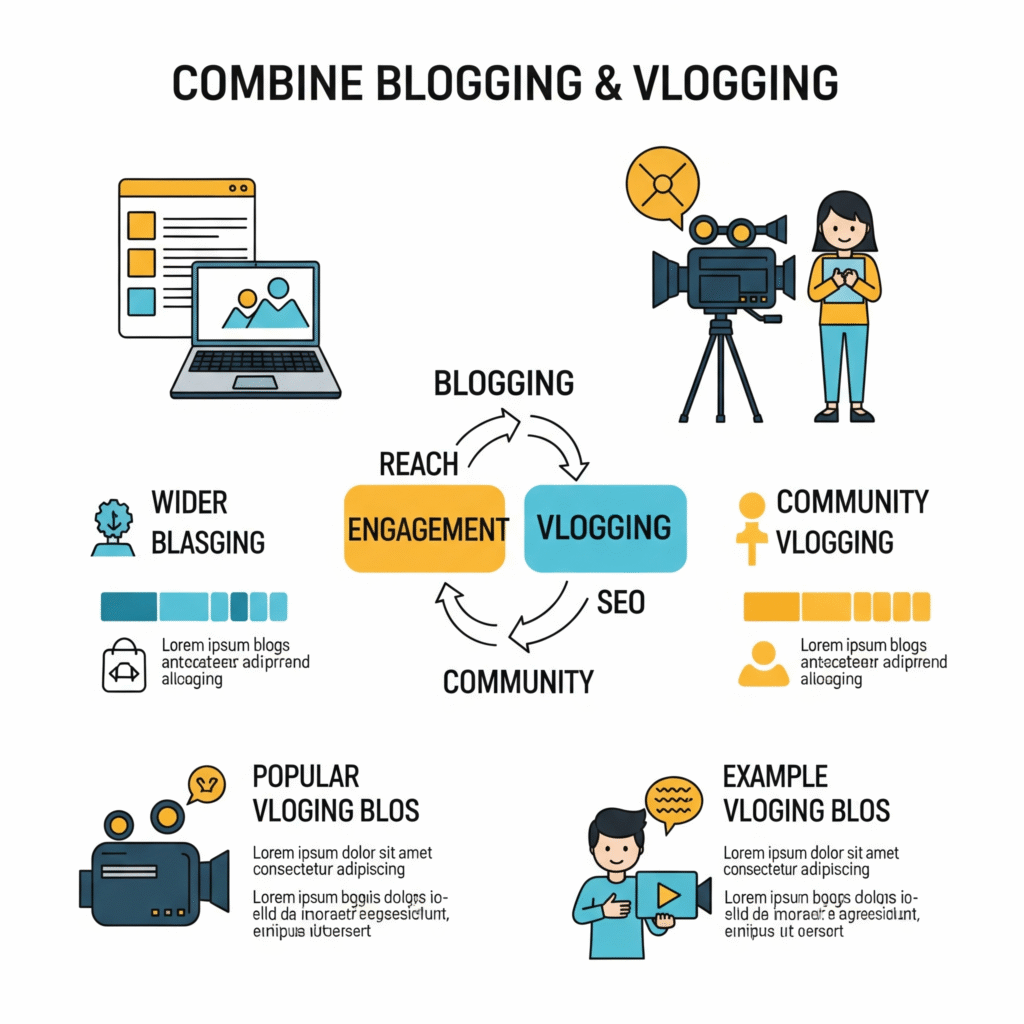
Conclusion
To sum it up, the difference between blogging and vlogging includes the format, tools, audience engagement, monetization methods, and learning curves. Blogging is ideal for written content lovers, while vlogging is perfect for those who enjoy visual communication.
Whether you’re starting a personal brand, teaching skills, or launching an online business, choosing the right medium can make all the difference. Evaluate your resources, goals, and preferences to pick the path that fits you best — or consider using both for maximum impact.
By understanding the difference between blogging and vlogging, A Detailed Comparison you can create better content, grow faster, and connect deeper with your audience.
